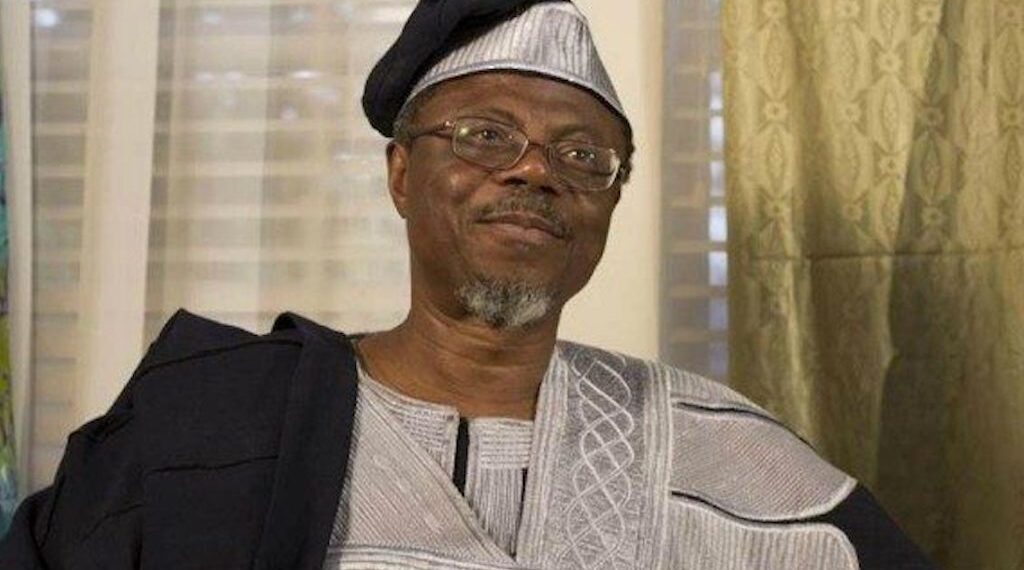...To get all news updates, Join our WhatsApp Group (Click Here)
Also Join our WhatsApp Channel (Click Here)
It was a great time to celebrate excellence and relive old memories on Sunday when scholars, associates, friends, and accomplished professionals converged in honour of the renowned historian, Toyin Falola.
The occasion was an evening of tributes attended by academics, politicians, university administrators, technocrats, newspaper editors, associates, friends, family, and mentees of Mr Falola who clocked 70 on Sunday.
The virtual event, beamed on various social media platforms including Zoom and YouTube, featured tributes from eminent Nigerians including former Nigerian president, Olusegun Obasanjo, Dosumu Awolowo, Richard Joseph, Kayode Fayemi, Bisi Fayemi, Michael Vickers, among others.
Born in Ibadan in 1953, Mr Falola is a globally recognized historian and professor of African Studies. He earned his BA and PhD (1981) in history at the University of Ife, Ile-Ife (now Obafemi Awolowo University) in Nigeria. He is a Professor of History at the University of Texas at Austin, where he has taught since 1991.
Among young researchers, Mr Falola is widely regarded as an outstanding mentor committed to nurturing young scholars by facilitating their professional viability and growth.
He has received several awards for his teaching commitment to African studies, including the 2010 Outstanding Graduate Teaching Award, the Jean Holloway Award for Teaching Excellence, and the Texas Exes Teaching Award.
‘Septuagenarian Induction’
Speaking at the event, Mr Obasanjo, who was a special guest of honour, inducted Mr Falola into the “septuagenarian circle”.
The former president, renowned for his letter-writing exploits, explained that he had a hard time choosing how best to deliver his speech before settling for letter writing.
“As someone who had gone ahead of you in chronological time-span, let me welcome you to the septuagenarian circle,” Mr Obasanjo said.
“I sincerely thank God for granting you the grace and favor to get this far. Getting to this biblical age is not an easy journey. Our existential challenges as humans, and more critically as Nigerians, are many, and even all the more so, for someone like you who shoulders many responsibilities as a scholar, a custodian of culture, an elder in your own right, a statesman, and a public intellectual.
“I must say that I deeply appreciate your unrelenting interventions in Nigeria’s unraveling as a nation. Nigeria needs her intellectuals, professionals and patriots; those who can quarrel with her to instigate the progress that seems to have eluded us for so long. And you have successfully situated yourself in that best tradition of patriotic interrogation.”
Mr Obasanjo, who described 70 as the age of reckoning, explained that Nigeria means a lot to him, at a level that most people still fail to understand. He added that it is clear to him, from the series of interventions Mr Falola has made, that the nation means a lot to the celebrated historian too.
He said: “I know it takes courage to step into the churning waters of national discourse in this great country of ours. It also takes lots of wisdom to be able to get a clear grasp of and be able to adroitly unravel the thorny issues we have been struggling with for many years.
“I thank you for making that decision not to remain silent and just bask in the glory of your well-deserved achievements as a global scholar and celebrated intellectual. You keep yourself in the water cold or warm.”
Mr Obasanjo noted that Mr Falola has gotten to the phase where, in cultural and spiritual terms, the hoary head becomes an exemplar of values. “We are both at a point where our sociocultural value frames are almost becoming a relic in the context of the revaluation of values the present generation champions,” he said.
The former president expressed his heartfelt wishes to Mr Falola, adding that “…may we both finish strong and finish well by witnessing the goodness of God to make Nigeria great in our lifetime.”
On her part, Bisola Falola, daughter of the revered historian, told beautiful stories of how Mr Falola, whom she described as “grandprof or grandpa”, helped in selecting the names for his four grandchildren and presided over their naming ceremonies, and others in the larger family.
“Indeed as mere newborns, the grandchildren were already getting a history education as he carried them around the house, going upstairs and back down, narrating the art, their origins, and stories they told,” she said.
“And then as they grew he would take them on contemplative walks around the neighborhood, and he became convinced that they were picking up his wisdom and ideologies.”
Speaking about Mr Falola’s incredible work ethic, she said that the grandchildren often express concerns about his busy schedule. She said: “Sometimes they ask, ‘does grandpa sleep in his office?’ Because they know he is always in there working, and they ask, as we all do, ‘but when does he sleep? When?!’”
Encomiums
In his tributes, Mr Fayemi, the immediate past governor of Ekiti State, said he considers himself an indirect student of the historian because he (Falola) taught his wife, Mrs Fayemi. He described Mr Falola as someone who is always keen to mentor and assist young scholars, adding that “…he was never judgemental maybe in that truest tradition of being a Yoruba exemplar” because he believes everybody has something to offer.
For Ayo Banjo, a former Vice-Chancellor of the University of Ibadan, Mr Falola is a model for young Nigerians, who enjoys being in the company of younger academics. “He is just doing his part and not putting on any airs,” he noted.
Tokunbo Awolowo-Dosunmu, a former Nigerian ambassador to The Netherlands, recalled how Mr Falola supported her works when she served as the nation’s ambassador at The Hague. “I believe Falola is one of the individuals that will help to fix this country one day,” she said.
Mrs Fayemi, immediate past first lady of Ekiti State, on her part described Mr Falola as a mentor and teacher who has been a source of inspiration to her and many other mentees and students. “As you continue your role as an elder in our community and beyond, we will continue to look up to you for guidance,” she said.
In his intervention, Akinjide Osuntokun, an emeritus professor, described Mr Falola as a humble person who cares about others. “I have never seen any historian as fecund, deep, profound and fertile as Toyin is,” he said, adding that Mr Falola makes every other person looks ordinary. “Toyin is just totally incomparable in terms of scholarship,” he added. He added that his works deserve a Nobel prize because “…there is no reason why (Falola’s) writings about Africa should not qualify him for a Nobel Laureate.”
More Tributes
Olu Obafemi—poet, playwright, author and Professor of English and Dramatic Literature—described Mr Falola as a “universal intellectual” who writes about literature in a way more versatile than many literary critics.
“He has a capacity to celebrate intellect, knowledge distribution, knowledge production… Toyin is a very rare gift to humanity,” he added.
Other eminent scholars and professionals who spoke glowingly about Mr Falola include Olabode Popoola, Ajibola Ogunsola, Evelyn Hauwa Yusuf, Moses Ochonu, among others.
In his reaction, Mr Falola said he refused birthday celebrations in the past because of the perilous state of affairs in Nigeria and parts of the African continent. He wondered what’s there to celebrate if the people across country—and indeed the continent—are not making progress.
“If our country is not successful, we should not exaggerate our own individual successes,” he said.
But despite the state of affairs, the historian noted that Nigeria can still harness its human resources to engender inclusive growth and development. He called on patriots not to look down on or denigrate the people as they remain key to ensuring that the nation fulfills its potential.
“We can be disappointed in leadership; but we should not be disappointed in our communities,” he said, adding that “nothing is wrong with our people.”
The historian also used the occasion to encourage young scholars to dream big and refrain from being ‘minimalists’ in the pursuit of their goals.
In a note, Jibrin Ibrahim described Mr Falola as “Master of networking, and for so many of us, a valued friend.” In these difficult times, he added, Mr Falola stands as a loud voice that is always uplifting Africa on the global stage and seeking pathways to rebuilding institutions.
In her vote of thanks, Abimbola Adelakun, who teaches in the African and African Diaspora Studies Department of the University of Texas at Austin, expressed gratitude to the invited guests for honoring the revered scholar. She also expressed appreciation to members of the organizing committee, dubbed “coup plotters”, including PREMIUM TIMES’ editor-in-chief, Musikilu Mojeed, for putting the event together.
The event also featured an Oriki session in which a Yoruba chanter, Halimat, serenaded Mr Falola and the guests with deep, emotive panegyrics.
You can get every of our news as soon as they drop on WhatsApp ...To get all news updates, Join our WhatsApp Group (Click Here)
Also Join our WhatsApp Channel (Click Here)

















